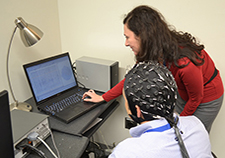Engaging With PTSD : EEGs, Diagnosis, Treatment
"It is a big data idea combining a classic test -- the EEG -- with a modern concept. This is how Google works, it looks for trends."
Colonel Rakesh Jetly, Canadian military's senior psychiatrist
"It takes out the whole notion that you treat by symptoms."
"Symptoms are very subjective. You never really know what medication fits what patients, and so this would take all that guesswork out of it."
Verner Knott, Royal Ottawa, new study's principal investigator
"In psychiatry, we struggle more."
"The reality is that thirty to fifty percent of patients with PTSD [post-traumatic stress disorder] or depression never get any better."
Jakov Shlik, psychiatrist, Royal Ottawa Hospital


At the Walter Reed National Military Medical Center in Bethesda, Maryland, a new tack was attempted to address an almost universally-recognized problem associated with stress, and in particular stress and exhaustion and depression associated with conflict zones. A troubling number of soldiers have returned from their experiences posted abroad in theatres of war where they witness or become part of the conflict and have become traumatized as a result, unable to function normally.
Up to the present time, questioning the symptoms that the individual speaks of has been the only reliable diagnostic tool to examine the onset, extent and impact of post traumatic stress syndrome, and then once diagnosis has been established, doctors offer whatever help they identify in the arsenal available to them, from counselling to drugs. And because people differ from one another, and the illness they suffer from differs one from another as well, it is next to impossible to find the right chemical combination.
It is estimated that roughly five percent of Canada's 65,000+ full-time military has acquired PTSD. This issue is a critical one to quality of life, and there are occasions when PTSD sufferers decide they will suffer no more. Fourteen active-duty personnel in 2015 decided they could no longer get on with their lives, burdened with the PTSD that gave them no rest, and they took their own lives to find peace in death. A November 23 Canadian Forces report also cited the fact that 65 percent of the suicides suffered from mental-health injury or disorder.
Anti-depressants haven't seemed to work all that well. Some make people feel zombie-like, others begin the onset of hyper-aggression, and others yet affect the body's nervous system, and even cause issues like swelling. There are many drugs that are considered for use, but few appear to offer an avenue to real relief from the condition's symptoms. Some describe what they go through, attempting to find a solution in one drug after another as being within a "chemical experimental station".
What a study at the Walter Reed Center focused on was the use of electroencephalograms which record electrical activity in the brain through electrodes attached to the skull. Psychiatry has used them to determine whether a brain tumour is present and responsible for a patient's change in personality, or to diagnose epilepsy. The study asked soldiers and veterans vexed with anxiety or depression of PTSD to submit to an EEG. Those scans were then uploaded to a database of about ten thousand scans of patients responding positively to drug therapy.
A California-based "predictive analytics" company, MYnd Analytics, had developed advanced software which was used in the search for matches between the scans. A predictive guide outlining which medication appeared best suited to particular patients based on the brain's electrical signature ensued. Only about 150 subjects took part in the original study, three years ago. But they reported less depression, decreased suicidal thoughts, and more engagement in their treatment.

Dr. Laura Manning Franke reviews EEG results with a research participant, who is wearing an electrode cap. (Photo courtesy of Richmond VAMC)
The protocol was expanded, fine-tuned for accuracy, and additional trials were held which yielded like results. Sufficiently so to convince the Canadian military to emulate that original study. The Canadian Forces Health Centre and The Royal Ottawa Operational Stress Injury Clinic, have embarked on their own study, with the application of the EEG. Suddenly doctors have a tool to aid them in their psychiatric diagnosis. Unlike other areas of illness or disease that afflict the body, blood tests reveal nothing about mental illness.
Conventionally, patients respond to questionnaires and they self-report their symptoms. From these sources doctors gain the outline of a diagnosis and proceed to treat the illness based on prior experience, instinct and professional guidelines; basically the process is one of trial and error. Theoretically, if all goes as it appears to be heading, the EEG adds a reliable and more precise diagnostic tool reflecting the patient's physiology.
Labels: Health, Medicine, Post Traumatic Stress Disorder, Science

0 Comments:
Post a Comment
<< Home